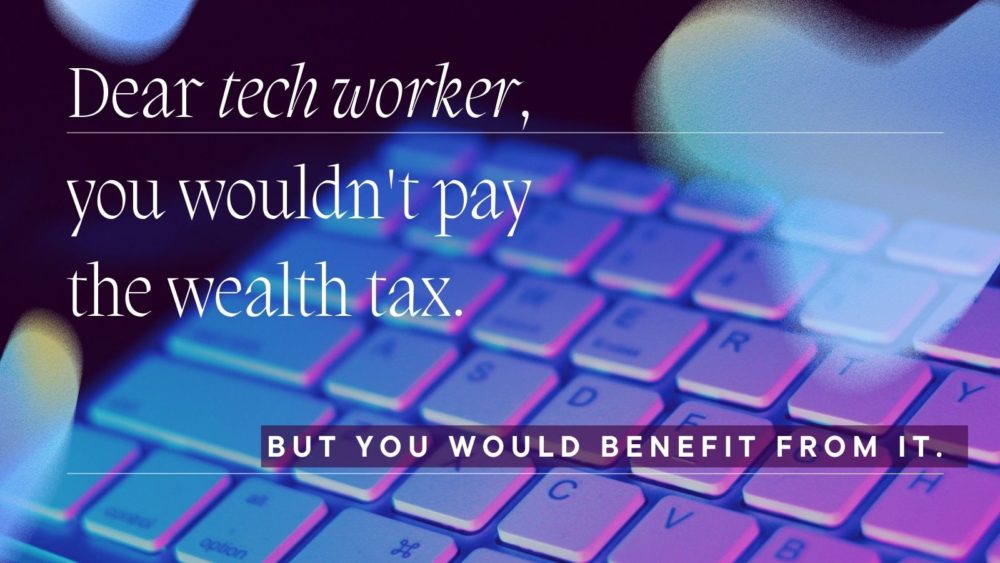
Tech workers don’t always get a fair shake in Washington. They tend to get blamed for everything from traffic to the housing crunch. But truthfully, the Evergreen State has had plenty of problems long before Microsoft or Amazon. It’s baked into our structures – starting with our very unfair, very inefficient tax system, which is ranked the most regressive in the nation.
It’s true. Washington, a place hailed for its progressive ideas and looming mountains, performs the worst when it comes to taxing people fairly. In order to fund public education, bridges and infrastructure, the courts and the ports, we depend on working people to pony up.
That’s why a group of us are working to try to change that. We’re focusing on passing a state wealth tax, which would apply to only the absolute wealthiest people in the state.
If you’re still reading this, that’s not you.
Tech Workers Won’t Pay the Wealth Tax
It’s natural to be worried when you hear about new taxes. Tech workers do pretty well for themselves and have paid their share in property and sales taxes. But it’s just not statistically likely that you are wealthy enough to pay this tax, even if you’ve had some great years.
A state wealth tax is like the annual property tax that we pay on our homes. But instead of paying based on property, the wealth tax is only applied to financial assets of the super wealth. Those who are taxed would pay 1% on the value of those financial assets like stocks, bonds, and other forms of business equity. And the first $250 million in value is exempted, which means you only start paying 1% rate on the first dollar in value above a quarter billion. The Department of Revenue estimates that 90% of the taxable wealth is held in publicly traded stocks and bonds.
Only about 700 people in the entire state would be subject to this tax.
And the revenue it would bring in – estimated to be billions of dollars each year – would dramatically improve our state’s economy. It would inject our tax-funded systems with much-needed revenue, but the ripple effect could potentially improve so much. It could shore up home prices, bring more jobs, and even curb ecological issues, like wildfires and other climate-related crises.
Still not sure? The Federal Reserve shows that in 2022, for the first time since it started tracking household wealth in 1989, the top 1% of households hold more wealth than the entire middle 60% of American households. You’re probably in that middle – and that means you serve to benefit, but not fund, this new tax.
If you’re lucky to be in the top 1% of wealthiest Washingtonians, you still probably aren’t wealthy enough to quality (sorry). Even if you are getting stocks as part of your compensation, the tax only kicks in at value exceeding $250 million a year.
Still not sure that you’d be below the threshold? Here’s a question: Have you paid the recently passed tax on realized capital gains, which impacts just over 8,000 taxpayers in Washington, with a majority also living in King County? No? OK, you are very far away from qualifying for a state wealth tax.
The Ultra-Rich Play By Different Rules
If you’re worried about the impact of taxing the very wealthy, consider this: They already don’t share their abundance. About 10% of the population owns 90% of corporate equity, so when corporate stocks do well, wealthy shareholders profit. But those increased profits do not trickle down or mean higher wages for workers. This wealth hoarding doesn’t help our state economy. It doesn’t help provide enough housing, or ensure that schools are safe and well-built, or pave roads, or fix bridges.
And despite the fears that tech entrepreneurs would move in response to enactment of this bill, Seattle continues to be one of the fastest growing cities in the country. Seattle was named the fastest growing big city in data released by the U.S. Census Bureau in 2023. Other cities – including Spokane, Everett, Bellingham, Pullman, and Vancouver – are also growing, driven by institutes of higher learning and technology.
We’ve long been conditioned to believe that what’s good for the billionaire is good for the person living a regular, non-private-jet life. But Washington is proof that this theory just doesn’t pan out. For a century, we’ve been taxing regular people – including tech workers – but letting the ultra-wealthy skate by, stashing the wealthy that they accumulate year over year.
Washington does have a lot of issues we need to address. With the support of workers in the tech sector who are willing to step up and support progressive taxation, we might actually be able to get it done.
This post was co-authored by Dr. Carolyn Brotherton and Hanna Brooks Olsen
More To Read
January 17, 2025
A look into the Department of Revenue’s Wealth Tax Study
A wealth tax can be reasonably and effectively implemented in Washington state
September 24, 2024
Oregon and Washington: Different Tax Codes and Very Different Ballot Fights about Taxes this November
Structural differences in Oregon and Washington’s tax codes create the backdrop for very different conversations about taxes and fairness this fall
July 19, 2024
What do Washingtonians really think about taxes?
Most people understand that the rich need to pay their share
